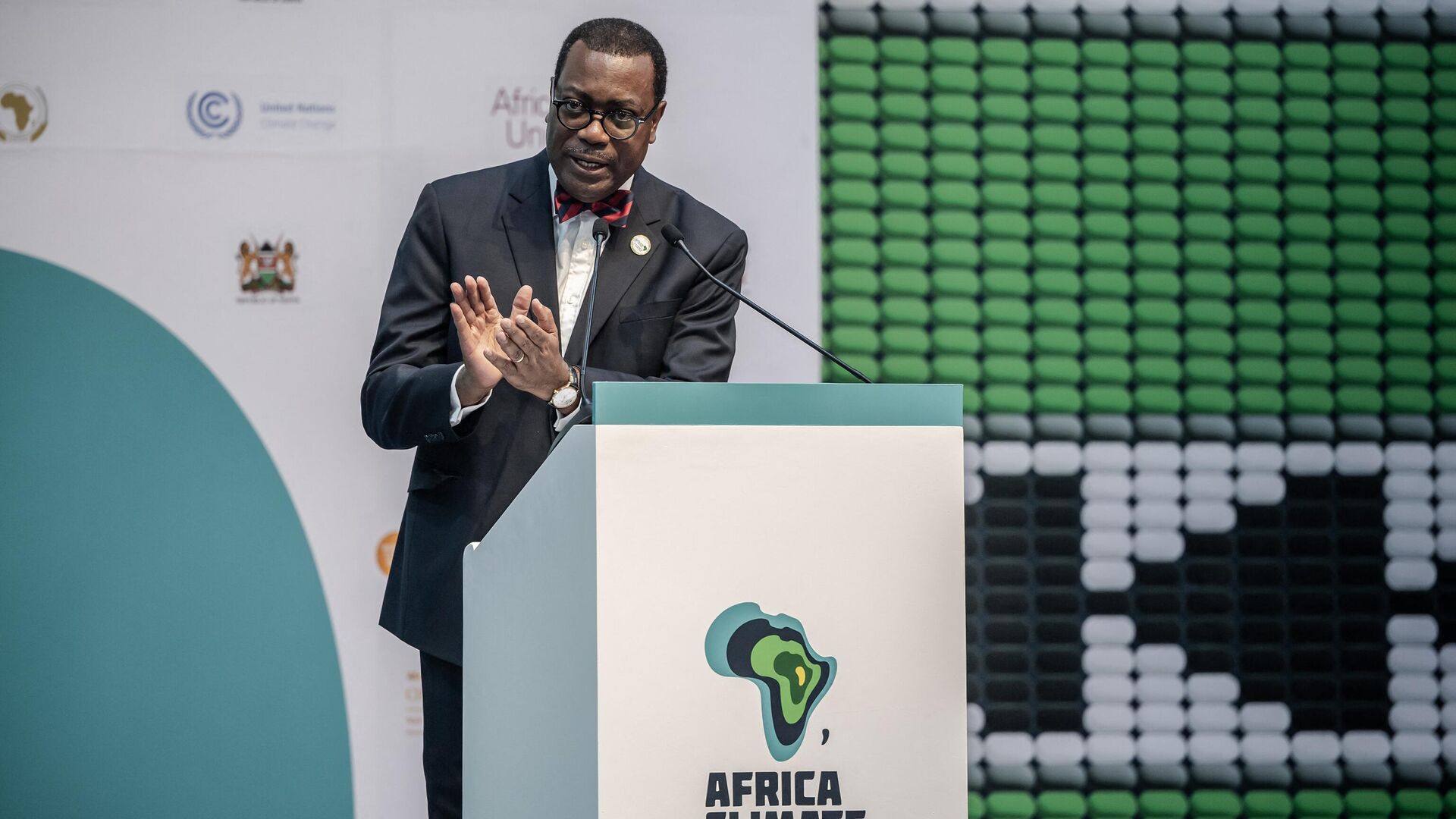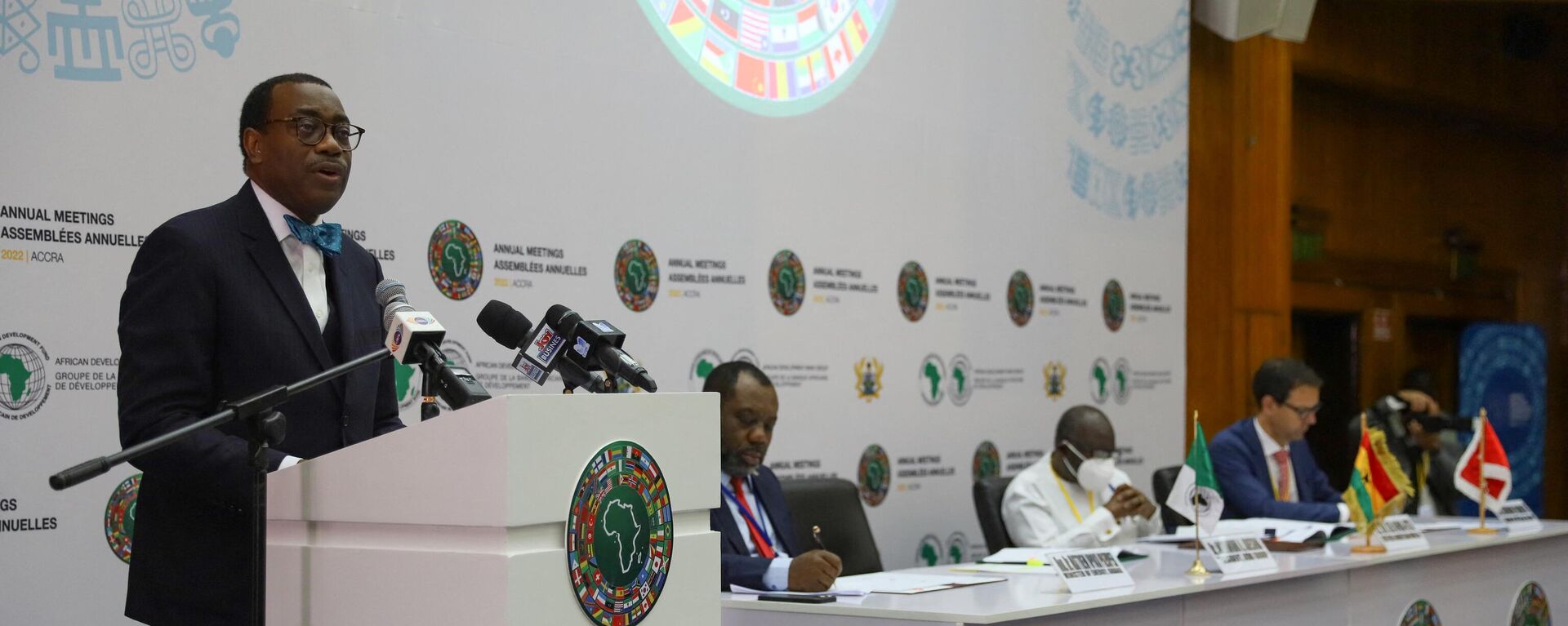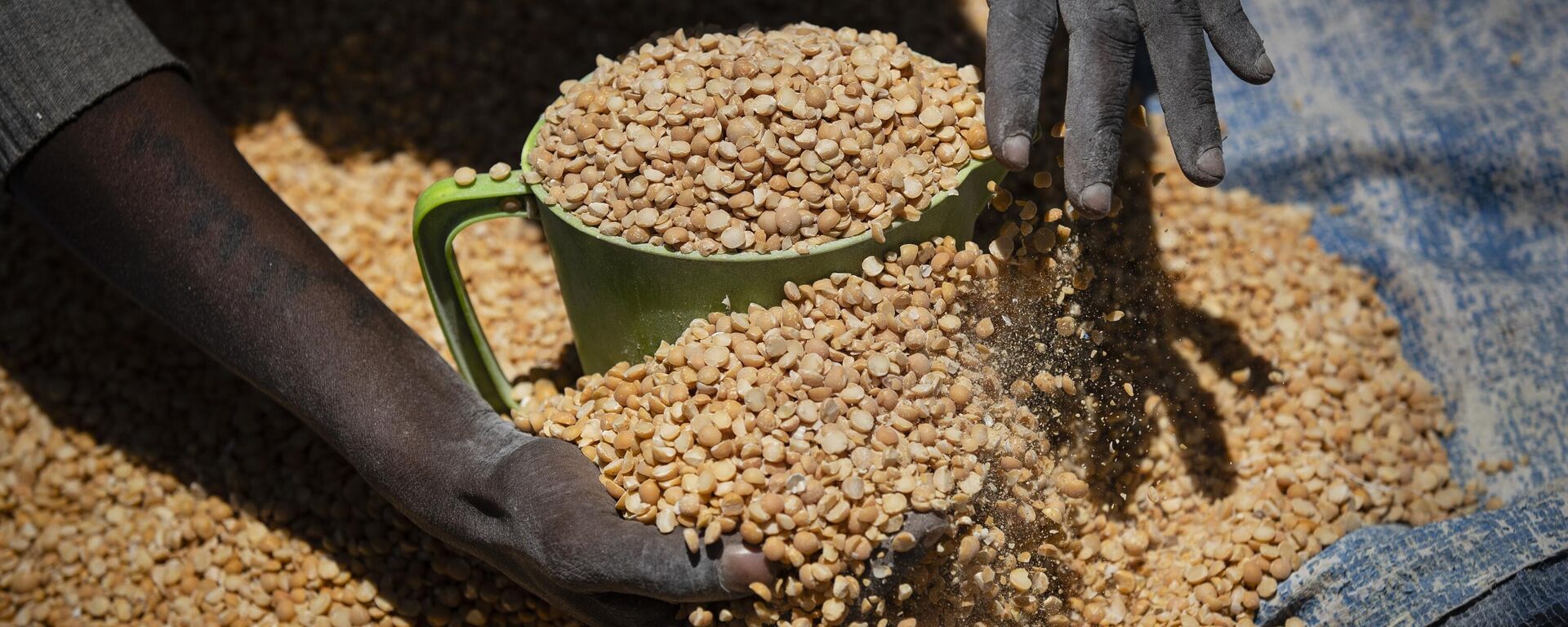https://en.sputniknews.africa/20231029/worlds-development-boat-is-leaking-afdb-chief-warns-of-imbalances-in-global-financial-system-1063168802.html
'World's Development Boat is Leaking': AfDB Chief Warns of Imbalances in Global Financial System
'World's Development Boat is Leaking': AfDB Chief Warns of Imbalances in Global Financial System
Sputnik Africa
Many African leaders have repeatedly expressed their concerns regarding the unjust treatment of their countries within the international financial system... 29.10.2023, Sputnik Africa
2023-10-29T13:50+0100
2023-10-29T13:50+0100
2023-10-29T13:50+0100
sub-saharan africa
african development bank (afdb)
finance
bank
united nations (un)
climate change
climate
funding
world bank
https://cdn1.img.sputniknews.africa/img/07e7/0a/1d/1063170314_0:160:3073:1889_1920x0_80_0_0_05c202fb4cda7607b564333be0698472.jpg
The substantial disparities in securing financial resources among the world's nations demonstrate that Africa will need time to overcome or tackle persistent challenges, such as climate change that necessitates investing in green technology, said Akinwumi Adesina, the President of the African Development Bank (AfDB), during the 2023 Kofi Annan Eminent Speakers' Lecture.Speaking at the lecture, which was renamed in 2019 to honor contributions of Kofi Annan, former Secretary-General of the United Nations, to global peace and development, Adesina stressed that as long as Africa continues to access credit on more stringent terms than the rest of the world, it will face greater challenges in recovering from global shocks.He recalled Kofi Annan as an exceptional leader, noting that "his voice would always resonate," regardless of whether he addressed issues related to Sustainable Development Goals (SDGs), global insecurity and conflicts, global pandemics, food insecurity, or governance.The official further stated that the global development effort is experiencing setbacks or "leakages," explaining that these include such global issues as climate change, famine, and the inability to handle pandemics. Adesina noted that every region may face challenges, including food insecurity, poor governance, conflicts, rising debt, and climate change. However, he stressed, Africa has been disproportionately affected due to its status as a developing region that heavily relies on imports and has nascent industries.Developing countries are struggling to tackling these problems "in the midst of stupendous wealth in the world," he said, adding that institutional investors will soon manage assets worth $145 trillion. Thus, the challenge confronting the world is not the lack of resources, but rather their high concentration in developed countries and among the few extremely wealthy individuals.According to Adesina, the current international financial system is hindering global development due to the presence of various challenges and its inability to tackle them. Revamping and transforming the global financial architecture is required to address global challenges more efficiently and expedite the accomplishment of SDGs, he emphasized. The head of the AfDB reiterated emphasized the importance of providing equal opportunities to all nations, regardless of their background, allowing them to pursue their aspirations and develop, ultimately improving the well-being of their citizens.The international community, he said, has a critical role to play in changing the situation and not allow "nearly three billion people, almost half of the world's humanity, to live on $2 or less a day in a world of unprecedented wealth." He went on to say that multilateral development banks have a distinctive role in addressing global development challenges, with a "unique" position to respond to global economic shocks, finance the SDGs, and mobilize funding essential to address climate change.The Kofi Annan Eminent Speakers' Lecture was launched by AfDB in 2006 as a forum for exchanging opinions, as well as sharing insights on inclusive growth and sustainable development. This year's event was held under the theme "The Changing Global Finance Architecture: Implications for Multilateral Development Banks Post-Covid."
https://en.sputniknews.africa/20230704/african-countries-push-for-changes-as-global-financial-architecture-failing-the-world-1060333855.html
https://en.sputniknews.africa/20230923/africa-to-end-food-insecurity-in-five-years-afdb-president-1062293415.html
Sputnik Africa
feedback@sputniknews.com
+74956456601
MIA „Rossiya Segodnya“
2023
News
en_EN
Sputnik Africa
feedback@sputniknews.com
+74956456601
MIA „Rossiya Segodnya“
Sputnik Africa
feedback@sputniknews.com
+74956456601
MIA „Rossiya Segodnya“
african development bank (afdb), finance, bank, united nations (un), climate change, climate, funding, world bank
african development bank (afdb), finance, bank, united nations (un), climate change, climate, funding, world bank
'World's Development Boat is Leaking': AfDB Chief Warns of Imbalances in Global Financial System
Many African leaders have repeatedly expressed their concerns regarding the unjust treatment of their countries within the international financial system, which often imposes exorbitant interest rates on them. They called for extensive reforms to the global financial structure to better serve developing nations.
The substantial disparities in securing financial resources among the world's nations demonstrate that Africa will need time to overcome or tackle persistent challenges, such as climate change that necessitates investing in green technology, said Akinwumi Adesina, the President of the African Development Bank (AfDB), during the 2023 Kofi Annan Eminent Speakers' Lecture.
Speaking at the lecture, which was renamed in 2019 to honor contributions of Kofi Annan, former Secretary-General of the United Nations, to global peace and development, Adesina stressed that as long as Africa continues to access credit on more
stringent terms than the rest of the world, it will face greater challenges in recovering from global shocks.
He recalled Kofi Annan as an exceptional leader, noting that "his voice would always resonate," regardless of whether he addressed issues related to Sustainable Development Goals (SDGs), global insecurity and conflicts, global pandemics, food insecurity, or governance.
"One of Kofi A. Annan's quotes that is apt for today’s lecture is: 'We need to create a world that is equitable, that is stable and a world where we bear in mind that the needs of others and not only what we need immediately. We are all in the same boat,'" he said.
The official further stated that the global development effort is experiencing setbacks or "leakages," explaining that these include such global issues as climate change, famine, and the inability to handle pandemics.
Adesina noted that every region may face challenges, including food insecurity, poor governance, conflicts, rising debt, and climate change. However, he stressed, Africa has been disproportionately affected due to its status as a developing region that heavily relies on imports and has nascent industries.
"The challenges of our world today, from the COVID-pandemic, climate change, rising debt, food insecurity, and conflicts, are keeping the lid on development globally. The global development boat is leaking, and the consequences will be devastating, unless we seal the leaking areas," the AfDB president emphasized.
Developing countries are struggling to
tackling these problems "in the midst of stupendous wealth in the world," he said, adding that institutional investors will soon manage assets worth $145 trillion. Thus, the challenge confronting the world is not the lack of resources, but rather their high concentration in developed countries and among the few extremely wealthy individuals.
"Inequalities are expanding rapidly [...].The challenge facing the world is therefore not lack of resources. It is that the resources are highly concentrated in developed countries, with few extremely rich, while the world's development boat is leaking," Adesina underscored.
According to Adesina, the current international financial system is hindering global development due to the presence of various challenges and its inability to tackle them. Revamping and transforming the global financial architecture is required to address global challenges more efficiently and expedite the accomplishment of SDGs, he emphasized.
The head of the AfDB reiterated emphasized the importance of providing
equal opportunities to all nations, regardless of their background, allowing them to pursue their aspirations and develop, ultimately improving the well-being of their citizens.
"We must ensure equal opportunities for all. Regardless of one's economic, social, or racial background, we must create a level playing field for a more just, fair, and equitable world," he said.
The international community, he said, has a critical role to play in
changing the situation and not allow "nearly three billion people, almost half of the world's humanity, to live on $2 or less a day in a world of unprecedented wealth." He went on to say that multilateral development banks have a distinctive role in addressing global development challenges, with a "unique" position to respond to global economic shocks, finance the SDGs, and mobilize funding essential to address climate change.
The Kofi Annan Eminent Speakers' Lecture was launched by AfDB in 2006 as a forum for exchanging opinions, as well as sharing insights on inclusive growth and sustainable development. This year's event was held under the theme "The Changing Global Finance Architecture: Implications for Multilateral Development Banks Post-Covid."



